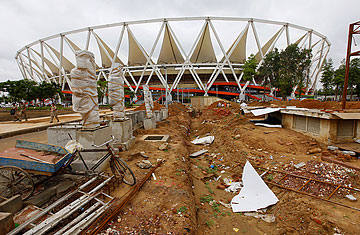
Construction material lies scattered outside the newly inaugurated Jawaharlal Nehru stadium, one of the venues renovated for the upcoming Commonwealth Games in New Delhi, on July 27, 2010
The rains that hit New Delhi last week were bad news for the 2010 Commonwealth Games, the biggest sporting spectacle ever to come to India. The event's two shooting ranges, one of them inaugurated just 60 days ago, were extensively damaged in the downpour. A week earlier, the temporary roof of the table-tennis court in the Yamuna Sports Complex collapsed under another deluge, and the new Shyama Prasad Mukherjee Swimming Complex, hyped as the best aquatic arena in the country, is now a mess of debris, electric cables and leaking eaves.
But it's not just bad weather that's plaguing India's efforts to get ready in time for its gold-medal moment in October. Inside the new showcase Nehru Stadium, construction of the weight-lifting arena was neglected until the end of July. A young swimmer this week tripped on a loose grill and hurt herself during the National Federation Cup, a test event held at the recently finished Talkatora Stadium. According to a six-month investigation and report by India's top anticorruption agency, the Commonwealth Games' infrastructure is in all-around bad shape, chiefly because of "large-scale corruption, usage of substandard material and repeated delays."
TIME obtained a copy of the Central Vigilance Commission's report, first made public on CNN-IBN on Wednesday, July 28. The report warns that the games, expected to draw at least 150,000 spectators, might turn into a hazard for athletes and spectators alike. Among the findings: "electrical installations not tested in 14 out of the 17 venues"; "quality-test records are fabricated to show compliance"; "quality of anticorrosive treatment on reinforcement steel was found poor"; "concrete core samples taken from the already laid concrete also failed to meet the requirement of strength during testing in an independent outside laboratory." The list goes on. "There is no guarantee of quality of the work done for the games," the report warns. "Electrical mishaps cannot be ruled out."
The Commonwealth Games, first held in 1930, draw athletes from countries of the former British Commonwealth and are billed as a prestige event. For a country that had been hoping to showcase its best to international tourists and media, India now seems to just hope to avoid disaster, with only two months remaining until the Oct. 3 opening ceremony. Whispers of corruption and shoddy construction have been making the rounds of the capital for months. On a recent visit to two of the 17 venues, the problems described in the Vigilance Commission's report were obvious. There were loose tiles, loose grilles, unfinished staircases and seating arrangements, protruding iron rods, leaking roofs and walls, and debris inside and out.
The report also found pervasive overcharging by the private contractors building the new venues. The Delhi government, the Sport Authority of India, and the central government, which bears most of the games' cost, oversee construction for the games, but all have so far refused to comment on the problems found in the Vigilance Commission report. In an interview this week, Suresh Kalmadi, chairman of the organizing committee for the games, absolved himself of responsibility for the construction problems: "It's not our business to oversee the making of the stadiums. My job is to run the games, not construct stadiums."
Prime Minister Manmohan Singh, during a joint press conference with British Prime Minister David Cameron on Thursday, July 29, minimized the problems. "I have reviewed the situation with the Cabinet Secretary on Wednesday, and I am satisfied that all necessary preparations are in place and will be in place," he said. "We look forward to a very successful games."
But the projected cost of the event has already exploded from an initial estimate of $75 million (3.45 billion rupees) to nearly $7.6 billion (350 billion rupees). And if the games go awry, there will be a political cost as well. The Hindu nationalist Bharatiya Janata Party (BJP), India's main opposition party, says the games are turning into a major embarrassment for the country and warns that it will hold the ruling Congress Party accountable. "There is no way out now," says senior BJP leader Gopinath Munde. "And if, God forbid, the games flop, they have to answer to the nation and the world."
This view is not limited to the opposition. A.K. Walia, a Congress Party politician from Delhi and member of the Commonwealth Coordination Committee, is not sure if all the venues will be ready by the Aug. 15 deadline, when they are supposed to be handed over to the organizing committee. After an inspection of some of the incomplete venues this week, Walia criticized the way the work was being handled. "The way the work is going on, I have doubts over some of the games venues, but I hope that they will be ready in time," he said.
To make matters worse, many top athletes have already decided to give the games a pass, from Jamaican sprinters Usain Bolt and Shelly-Ann Fraser to British cycling champion Victoria Pendleton and Australian tennis star Samantha Stosur. And for the first time in 44 years, Queen Elizabeth II will not attend, sending Prince Charles in her place. The Queen cited a busy social calendar as her reason for missing the games. Given the new concerns over safety, Delhi's other invited guests may soon be sending regrets as well.
Chakrabarti is the chief national correspondent of CNN-IBN.
